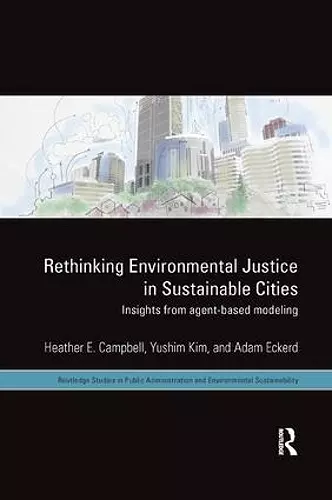Rethinking Environmental Justice in Sustainable Cities
Insights from Agent-Based Modeling
Heather E Campbell author Yushim Kim author Adam M Eckerd author
Format:Paperback
Publisher:Taylor & Francis Ltd
Published:10th Mar '17
Currently unavailable, and unfortunately no date known when it will be back
This paperback is available in another edition too:
- Hardback£150.00(9780415657440)

As the study of environmental policy and justice becomes increasingly significant in today’s global climate, standard statistical approaches to gathering data have become less helpful at generating new insights and possibilities. None of the conventional frameworks easily allow for the empirical modeling of the interactions of all the actors involved, or for the emergence of outcomes unintended by the actors. The existing frameworks account for the "what," but not for the "why."
Heather E. Campbell, Yushim Kim, and Adam Eckerd bring an innovative perspective to environmental justice research. Their approach adjusts the narrower questions often asked in the study of environmental justice, expanding to broader investigations of how and why environmental inequities occur. Using agent-based modeling (ABM), they study the interactions and interdependencies among different agents such as firms, residents, and government institutions. Through simulation, the authors test underlying assumptions in environmental justice and discover ways to modify existing theories to better explain why environmental injustice occurs. Furthermore, they use ABM to generate empirically testable hypotheses, which they employ to check if their simulated findings are supported in the real world using real data.
The pioneering research on environmental justice in this text will have effects on the field of environmental policy as a whole. For social science and policy researchers, this book explores how to employ new and experimental methods of inquiry on challenging social problems, and for the field of environmental justice, the authors demonstrate how ABM helps illuminate the complex social and policy interactions that lead to both environmental justice and injustice.
"Rethinking Environmental Justice in Sustainable Cities is an important book, not only for its examination of the causes and contexts of environmental injustice in US cities, but also as an exemplar of how agent-based modelling can be used to illuminate questions of major policy significance. The book will be of great value to the rapidly expanding community of researchers developing computational models to provide advice in a range of policy fields."—Nigel Gilbert, University of Surrey, UK.
"For a qualitative researcher who investigates environmental justice primarily through archival material and interview data, this book is certainly thought provoking. The authors advocate the use of Agent Based Modeling, a method of computational simulation, to understand causes of environmental injustice at the systems level. They argue that injustice might be an "emergent" outcome, unintended by any particular actor or the result of malicious intent. Furthermore, emergence could be used to think more critically about environmental policy and planning for purposes of urban sustainability. Whether or not one is a fan of computational simulation, this book is sure to inspire heated debates in the classroom and engage the important issue of EJ from yet another perspective." —Brinda Sarathy, Pitzer College
"Further, Campbell, Kim, and Eckerd have been able to firmly ground their models’ assumptions on existing research (with a focus on the United States) and clearly and convincingly explain and illustrate the value of ABM to model complex behavior that is otherwise difficult to study and understand using more simplistic methods. The book shows that ABM can generate interesting insights for public administrators and policy makers beyond what is possible with methods that do not heed to the complexity of urban systems." --Stefan Verweij, University of Bamberg, Germany
"Rethinking Environmental Justice in Sustainable Cities is an important book, not only for its examination of the causes and contexts of environmental injustice in US cities, but also as an exemplar of how agent-based modelling can be used to illuminate questions of major policy significance. The book will be of great value to the rapidly expanding community of researchers developing computational models to provide advice in a range of policy fields."—Nigel Gilbert, University of Surrey, UK.
"For a qualitative researcher who investigates environmental justice primarily through archival material and interview data, this book is certainly thought provoking. The authors advocate the use of Agent Based Modeling, a method of computational simulation, to understand causes of environmental injustice at the systems level. They argue that injustice might be an "emergent" outcome, unintended by any particular actor or the result of malicious intent. Furthermore, emergence could be used to think more critically about environmental policy and planning for purposes of urban sustainability. Whether or not one is a fan of computational simulation, this book is sure to inspire heated debates in the classroom and engage the important issue of EJ from yet another perspective."—Brinda Sarathy, Pitzer College
"Further, Campbell, Kim, and Eckerd have been able to firmly ground their models’ assumptions on existing research (with a focus on the United States) and clearly and convincingly explain and illustrate the value of ABM to model complex behavior that is otherwise difficult to study and understand using more simplistic methods. The book shows that ABM can generate interesting insights for public administrators and policy makers beyond what is possible with methods that do not heed to the complexity of urban systems." --Stefan Verweij, University of Bamberg, Germany
ISBN: 9781138066694
Dimensions: unknown
Weight: 540g
252 pages